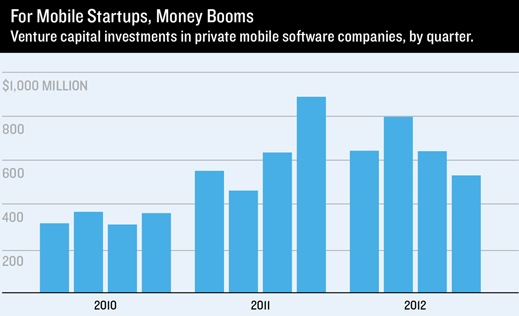For Investors, Mobile Startup Boom Gives Way to Caution
Viddy, a mobile video-sharing service that bathed in media attention and more than $36 million in investor funds last year (see “What’s the Next Instagram?”), is facing hard times. Users have abandoned its app by the millions, and last month it had to fire its cofounder and CEO and a third of its staff.
Ask almost any venture capital investor how he or she feels about mobile computing, and inevitably the answer is bullish. But after a couple of years of pouring money into startups developing mobile apps, some investors are turning into skeptics, saying that mobile computing startups—particularly those looking for consumer hits—have proved more expensive and riskier than they expected.
Private companies involved in mobile computing attracted more than $2 billion in venture capital in 2012, around 10 to 15 percent of all investments made by venture capitalists, according to the research firm CB Insights. Another survey, by PricewaterhouseCoopers and the National Venture Capital Association, found that the number of mobile software startups getting funded hit a three-year high at the end of 2012, reaching 40 startups a month.
The wave of dollars was propelled by several big successes, notably Instagram, whose simple photo-sharing app quickly found a huge audience. Facebook acquired the company for $1 billion last April.

But now the mobile boom could be headed for a shakeout as investors become choosier (see “The Narrowing Ambitions of Venture Capital”). One measure of their caution is what Silicon Valley has termed the “Series A” crunch. Technology investors have made seed, or early-stage, investments in 4,000 companies since 2009. But many of these companies are finding that their investors won’t be giving them anymore. CB Insights predicted in December that the crunch could lead 1,000 startups to become “orphans.”
Some investors are avoiding consumer apps, saying it’s become too risky to guess which will prove a hit in Apple’s App Store. Daniel Leff, a partner at Globespan Capital Partners, says he will only invest in companies building the “picks and shovels” of mobile computing—unsexy software tools like the ones that count clicks or deliver ads. One of his firm’s successes was Quattro Wireless, a mobile advertising network that Apple acquired in 2010 for $275 million.
Howard Hartenbaum, an investor at August Capital and the first to put money into Skype, says he also avoids companies whose main asset is “mindshare” but that don’t have a clear business plan. “No one has figured out how to monetize mobile all that great,” he says.
Instead, Hartenbaum has been investing in companies making tools for other app developers. His firm recently led a $25 million investment in one such startup, Urban Airship. It makes a software tool that lets developers and marketers send “push” notifications. Even if those apps flop, Urban Airship could still do well.
Another reliable way to make money is to help large companies caught off guard by the growth of mobile computing. Lightspeed Venture Partners’ Ravi Mhatre says he’s interested in startups who have security software to help corporate IT departments as they struggle to integrate employees’ smartphones into their systems.
Consumer apps still offer the biggest potential payoffs, but investors are being careful about where they put their money. Albert Wenger, a partner at Union Square Ventures, says he tries to invest in mobile companies whose apps enable people to do things that aren’t possible on PCs, such as monitor their heart rate or book hotels at the last minute while traveling. His firm backed Hailo, a company in London that built an app for hailing a cab on a smartphone. “But we’re not looking for the CNN for mobile, which 99 percent likely is actually CNN itself,” says Wenger.
The companies that are hurting are those that haven’t found a way to make money even after their apps have caught on. Another Union Square investment, Foursquare, employs over 100 people and has raised about $71 million. But its efforts to make money off its popular location-sharing app (most recently through $1 off coupons to Burger King) haven’t yet amounted to much, and Foursquare has had trouble raising the extra $50 or $100 million it needs.
Not everyone thinks pessimism is called for, though. Battery Ventures partner Brian O’Malley, an investor in Viddy, the ailing video startup, says the company’s lack of revenue might actually make it a more attractive takeover target for a company interested in its technology. Many investors are lately becoming “overly negative,” he says.
Keep Reading
Most Popular
Large language models can do jaw-dropping things. But nobody knows exactly why.
And that's a problem. Figuring it out is one of the biggest scientific puzzles of our time and a crucial step towards controlling more powerful future models.
The problem with plug-in hybrids? Their drivers.
Plug-in hybrids are often sold as a transition to EVs, but new data from Europe shows we’re still underestimating the emissions they produce.
How scientists traced a mysterious covid case back to six toilets
When wastewater surveillance turns into a hunt for a single infected individual, the ethics get tricky.
Google DeepMind’s new generative model makes Super Mario–like games from scratch
Genie learns how to control games by watching hours and hours of video. It could help train next-gen robots too.
Stay connected
Get the latest updates from
MIT Technology Review
Discover special offers, top stories, upcoming events, and more.